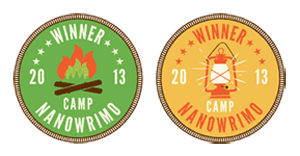by Kathy Kitts
 In Poets & Writers Magazine, they have a column titled “Why We Write.” I enjoy reading what the guest authors have to say and how they interpret the questions. Today, I would like to respond.
In Poets & Writers Magazine, they have a column titled “Why We Write.” I enjoy reading what the guest authors have to say and how they interpret the questions. Today, I would like to respond.
I believe we write for two reasons: to provide ourselves what the world will not or cannot, or to share a lesson we have learned with others. Because of this, a story often ends up attempting to serve both the needs of the author and the message. Unfortunately, it is rare that a story can excel with two masters, and a particular piece may devolve into a schizophrenic mess. I see this frequently in critique sessions.
One of my critique buddies is Native American. She recently wrote a fictionalized version of a sacred story. In the circle, it was unanimous that the piece needed some structural work. She dismissed the criticism by stating that this structure was how the story went and we would just have to deal with it. Everyone in the group scowled, and I quoted Ben Bova, “Sorry, but the reader is always right.”
Indeed, if that were the case, then the story was not fiction but explicitly nonfiction. I asked her purpose. Did she want to document the sacred stories of her people or to share the greater life-lesson? She wanted to share the lesson. Then as a writer, she had no choice but to do what would be best for the piece even if that meant changing the story itself. If the goal is to teach, then the author must consider the target audience. If they can’t understand the medium (e.g., the structure in this case), then the message is lost and the story is a failure. Sometimes, an author must lie to tell the truth. Is that not the essence of fiction?
In my opinion, the reason she wrote the story is actually quite personal, and I do not know or understand it. And if the real purpose of the story is personal, then it is perfectly fine as it is. Writing is a lot cheaper than therapy. However, if an author decides that sharing with an audience is more important, then the message must come first and the story crafted to reflect that. Even if it requires we “kill our darlings.”
This motivational push and pull is especially difficult in deciding whether to write a memoir or an autobiography. Autobiography is classified as nonfiction and there can be no fuzziness of memory. If you quote a date, your reader better be able to look it up and verify it. In memoir, which is shelved in my library under fiction, the author has more latitude and can change the order of events to make the story build or be more cohesive.
What if you don’t know whether a specific piece is more about you or more about your message? I suggest there’s a hint in how you like your superheroes. Are you a Superman fan or do you prefer Batman? Should your superhero be perfect? Bullets bounce off and you get to save the day without breaking a sweat? Or does the dark knight’s flawed humanness draw you in? If you are a Superman type, then perhaps this piece needs to be more about what you need. If you prefer Batman, then send up that bat signal and share it with the world. Either way…
Happy Writing!
 Dr. Kathy Kitts, a retired geology professor, served as a science team member on the NASA Genesis Discovery Mission. Before that, she directed a planetarium for nine years. She has dozens of non-fiction publications spanning professional papers to textbooks to general interest articles. However, she no longer writes about “what is” but rather “what if.” Her speculative short fiction has appeared in James Gunn’s Ad Astra (writing as K. Eisert), Mad Scientist Journal, and The Storyteller’s Anthology. Born and raised in the Southwest, she is currently living in the high desert of New Mexico.
Dr. Kathy Kitts, a retired geology professor, served as a science team member on the NASA Genesis Discovery Mission. Before that, she directed a planetarium for nine years. She has dozens of non-fiction publications spanning professional papers to textbooks to general interest articles. However, she no longer writes about “what is” but rather “what if.” Her speculative short fiction has appeared in James Gunn’s Ad Astra (writing as K. Eisert), Mad Scientist Journal, and The Storyteller’s Anthology. Born and raised in the Southwest, she is currently living in the high desert of New Mexico.
This article was originally published in the December 2013 issue of SouthWest Sage and is reprinted here with permission of the author.






I really love this distillation of why people write. I struggled for years with my writing because I didn’t appreciate this distinction (a la “Superman” vs. “Batman”) until the pandemic. With all the “bonus time” of seclusion, I began to understand which are my “Batman” creations, and my shared writing has gone to another level. (If the author wishes to contact me directly regarding this comment, feel free to share my email address.)